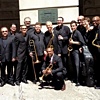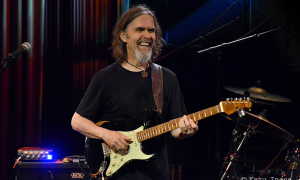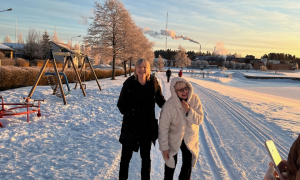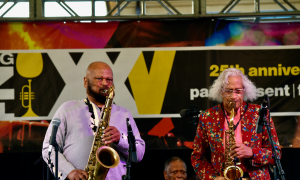Home » Jazz Articles » SoCal Jazz » Michael Lauren: Give My Regards To Portugal
Michael Lauren: Give My Regards To Portugal

My dad used to take me to the drum battle concerts that featured Buddy Rich and Gene Krupa. Then one day you hear Elvin Jones and Tony Williams. Your ears start to turn and you realize there is more than one way to do this.
—Michael Lauren

Michael Lauren
drumsb.1950

Chuck Berry
guitar, electric1926 - 2017

Tom Jones
woodwindsb.1952

Mike Stern
guitarb.1953

Paul Anka
vocalsb.1941

Bill Frisell
guitar, electricb.1951

Tom Harrell
trumpetb.1946

Jerry Jemmott
bass, electricb.1946

Bob Mintzer
saxophoneb.1953
But how does a man meant to play jazz end up with a career in Broadway that ultimately leads to jazz and, oh yeah, winds up in Portugal? Let's let Lauren, who spoke with the energy and enthusiasm of a man half his age, tell the story.
All About Jazz: Are you from New York City originally or like so many did you migrate there pursuing the dream?
Michael Lauren: I grew up in the suburbs of New York City and spent most of my working life there. In the early 1970's I went to Boston for three years to study with the great

Alan Dawson
drums1929 - 1996

Leonard Bernstein
composer / conductor1918 - 1990
AAJ: Was he your first teacher?
ML: Yes, his name was Nat Foodman. He played with

Harry Belafonte
vocals1927 - 2023
AAJ: So, you went on to play Broadway?
ML: Yes, it was my destiny. I've had a very versatile career and consider myself a multi-stylist. For Broadway your reading skills need to be very high and you, of course, are working with a conductor. You have to be able to work with dancers and to be able to jump in and learn the job quickly. It was normal for many of us to do several things within the course of a day. By that I mean gigging separately at a jazz club in the evening and doing something else over here or there to learn and develop other skills. Broadway eventually burned out for me as it didn't allow me to be creative enough. It just wasn't what I wanted to be doing. Basically, with Broadway you are an actor. They have a script for you, and they aren't looking to change anything up. When you are a sub, you have to be able to come in and play the other drummer's book right there on the spot. Lots of pressure, no rehearsal, no second chances, it's a tough job. Fortunately, I was good at it. But it was the hardest job I ever had.
AAJ: How long did you do that before pursuing jazz and other opportunities?
ML: I believe it was the early 90's when I was doing Guys and Dolls when I decided to move on. Some of the best melodies ever written were for Broadway shows. The American Songbook is made up of many tunes for Broadway shows. So, I will say that the actual experience of working in theater was one of the greatest experiences of my life.
AAJ: Starting out at ten years old learning music with the complexities that required strong reading skills, perfection, and working with a conductor, did you find it to be a good training ground that set you up well to ultimately learn and incorporate other genres of music?
ML: Yes. Now during the Broadway years, I had started to learn and play jazz. The first jazz tune I ever learned was "Mack the Knife." I learned it on brushes, not with sticks. Early on the music of artists like

Horace Silver
piano1928 - 2014

Frank Sinatra
vocals1915 - 1998
AAJ: Do you come from a musical family?
ML: My mother was a classical pianist at a professional music school in New York City. My grandmother was a ragtime pianist. So, yeah there was music in my home. It was encouraged. I was playing a recorder by the time I was five or six. Music was very much encouraged in school and in our communities. Music was a priority in schools and society more so on the east coast and the Midwest regions. You know, when you think about the history of jazz and its strong development in New Orleans, one of the reasons is that it was a staging area for the Union Army. The army had many many bands. When they left at the end of the Civil War, they left all the instruments. Those band traditions were powerful and carried on.
AAJ: That's interesting. I had never really perceived or thought of that aspect. What artists and styles of music were you mostly exposed to?
ML: Well, back in the sixties I was playing rock n roll. Learning to play the

The Rolling Stones
band / ensemble / orchestrab.1962
AAJ: I've never been up there, but I always think of the movie Dirty Dancing as a reference point.
ML: Oh, well that is exactly it. That's exactly it. In junior high I was playing in big bands and went to summer music camps. I was also being trained as an orchestral musician. So, I feel fortunate to having been exposed to all the great many styles of music. As you know, the sixties was an incredibly vibrant period of time for music. As a drummer you had to play everything. If someone wanted a Latin rock drummer you said yes, whether you knew it or not. You figured it out, you learned it. It was that kind of world.
AAJ: Which drummers influenced you the most early on and throughout your career?
ML:
Louis Hayes
drumsb.1937

Sonny Payne
drums1926 - 1979

Buddy Rich
drums1917 - 1987

Gene Krupa
drums1909 - 1973

Elvin Jones
drums1927 - 2004

Tony Williams
drums1945 - 1997

Billy Higgins
drums1936 - 2001

John Coltrane
saxophone1926 - 1967

Rashied Ali
drums1935 - 2009
AAJ: Tell us about your teaching career.
ML: I became involved in the Drummer's Collective. It was a main gig for me for some twenty-five years, in addition to playing band gigs. I've always thought strongly about teaching. Some colleagues think I should have spent more time trying to make a name for myself. I was never about that. I am happy to have shared my knowledge with my students. I have no regrets. The Drummer's Collective was a great opportunity for sharing with other faculty members and students. It was never a sense of competition. Everyone wanted to help each other be a better player.
AAJ: What led you to Portugal?
ML: A great opportunity to teach that was just too good to turn down. I had a number of Portuguese students in New York City that encouraged me to go to Portugal. They thought I would really like it there. I do enjoy the European culture. One of the top drummers in Portugal was my student and he invited my wife and I to come over for a visit. We really loved it and thought about retiring there, but it just didn't seem practical as far as job security and all that. We visited a couple of more times, did some workshops and resigned ourselves to the fact that it wasn't meant to be. Then shortly after going back home I received a call that offered me a great position to teach at the Escola Superior de Musica e Artes do Espectaculo (ESMAE) in Porto. I've had a wonderful time being part of the growth in jazz culture in Portugal. We have now lived in Porto for seventeen years.
AAJ: How did the formation of the All-Star band happen?
ML: I knew there were many musicians here that like playing American jazz. I was fortunate to meet a few when I first came over to Portugal. My All-Star band consists of some of the finest and most experienced musicians and composers in Portugal. They are bassist

Carlos Barretto
bassb.1957
 "
data-original-title="" title="">Diogo Vida, trumpeter
"
data-original-title="" title="">Diogo Vida, trumpeter 
Hugo Alves
trumpetb.1973

Nuno Ferreira
guitarb.1975

Jose Menezes
saxophoneb.1957
AAJ: Your first record, Once Upon A Time in Portugal, has a couple of beautifully arranged standards but is mostly new material from various members of the band, including yourself. How important is it that there is a collective to these contributions?
ML: That first record was more of a hard bop deal. We did our take on the "Nearness of You."
AAJ: I must say I loved your arrangement on that.
ML: Thank you very much. I was proud of that. We also did a

Bobby Timmons
piano1935 - 1974
AAJ: Your recently released second offering, Old School/Fresh Ideas, continues and perhaps swells that collective process. Tell us about your new record. You must be excited about it.
ML: Yes, I really am. I wanted a bit more room on this record. To keep the hard bop, but to mix in a blues tune, a funk tune, and just expand it a little within the same feel.
AAJ: Your concept of having short yet fertile duets interspersed between songs on this record has an impact on how your music is heard and received. What was the intent of this approach?
ML: On the first record I had separators. Solos that not only gave the guys their own space but that became a bridge to the next tune. Not on every song, but still throughout. It was also thematic in that I had the guys play contemporary solos that set a mood for the next song. For the second record I didn't want to do the same thing. I instead came up with several drum grooves and played them at a session with no rehearsal and just waited to see who wanted to jump in on each one. So, six grooves and who wants to play 'em? Then we just started to lay them down. Some were the first take. They are all fresh and contemporary sounding. It's like cleaning your palette before the next tune.
AAJ: You would seem to have developed a comfortable and accessible sound. Are your plans to do more with your All-Stars and continue to share with and educate eager young minds?
ML: I want to play more. I love this band. I'm very happy with and know we have made a great record here. I really want to reach younger people with jazz. My students play jazz, but often its not swinging jazz. Certainly not hard swinging jazz. This isn't just here in Portugal. Old School/Fresh Ideas is an eclectic record that is not just for jazz fans but also designed to draw in younger listeners who might here something they can relate to it. My tune "Lisboa Boogaloo" is an example that many younger fans have founding something in. My students like the swing feel and the sound, we just have trouble getting them to focus long enough to listen to a solo no matter how good it is. But it will all come around. I'm very much an optimist.
AAJ: You must sometimes miss the chance to gig out with some of the jazz elite in New York City.
ML: Of course. Especially the studio work and the opportunity to play R&B, funk, and Roots American music. But many of the moments and opportunities that have come along here have been very sweet. Portugal, however, motivated me to record my first jazz albums as a leader. Also, I have been able to give more master classes and clinics. I was the artistic director for four years of a performance and lecture series on jazz sponsored by the University of Porto. The series included two history of jazz concerts. A concert contrasting big band styles and a concert performing

Oliver Nelson
saxophone1932 - 1975

Benny Golson
saxophone, tenor1929 - 2024
Tags
SoCal Jazz
Michael Lauren
Jim Worsley
Portugal
Porto
Chuck Berry
Tom Jones
Mike Stern
Paul Anka
Bill Frisell
Darlene Love
Tom Harrell
Jerry Jemmott
bob mintzer
Alan Dawson
Leonard Bernstein
Nat Foodman
Harry Belafonte
Horace Silver
frank sinatra
Rolling Stones
Louis Hayes
Sonny Payne
Buddy Rich
Gene Krupa
Elvin Jones
Tony Williams
Billy Higgins
John Bonham
John Coltrane
Rashied Ali
Bobby Timmons
Oliver Nelson
benny golson
Comments
PREVIOUS / NEXT
Support All About Jazz
 All About Jazz has been a pillar of jazz since 1995, championing it as an art form and, more importantly, supporting the musicians who make it. Our enduring commitment has made "AAJ" one of the most culturally important websites of its kind, read by hundreds of thousands of fans, musicians and industry figures every month.
All About Jazz has been a pillar of jazz since 1995, championing it as an art form and, more importantly, supporting the musicians who make it. Our enduring commitment has made "AAJ" one of the most culturally important websites of its kind, read by hundreds of thousands of fans, musicians and industry figures every month.







 Buy Now
Buy Now



















